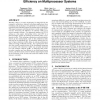Free Online Productivity Tools
i2Speak
i2Symbol
i2OCR
iTex2Img
iWeb2Print
iWeb2Shot
i2Type
iPdf2Split
iPdf2Merge
i2Bopomofo
i2Arabic
i2Style
i2Image
i2PDF
iLatex2Rtf
Sci2ools
123
click to vote
FPL
2007
Springer
2007
Springer
An FPGA Approach to Quantifying Coherence Traffic Efficiency on Multiprocessor Systems
Recently, there is a surge of interests in using FPGAs for computer architecture research including applications from emulating and analyzing a new platform to accelerating microarchitecural simulation speed for design space exploration. This paper proposes and demonstrates a novel usage of FPGAs for measuring the efficiency of coherent traffic of an actual computer system. Our approach employs an FPGA acting as a bus agent, interacting with a real CPU in a dual processor system to measure the intrinsic delay of coherence traffic. This technique eliminates non-deterministic factors in the measurement, such as the arbitration delay and stall in the pipelined bus. It completely isolates the impact of pure coherence traffic delay on system performance while executing workloads natively. Our experiments show that the overall execution time of the benchmark programs on a system with coherence traffic was actually increased over one without coherent traffic. It indicates that cacheto-cache ...
| Added | 16 Aug 2010 |
| Updated | 16 Aug 2010 |
| Type | Conference |
| Year | 2007 |
| Where | FPL |
| Authors | Taeweon Suh, Shih-Lien Lu, Hsien-Hsin S. Lee |
Comments (0)

